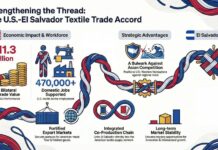On Monday, India initiated consultations with Indonesia under the World Trade Organization (WTO) guidelines regarding the extension of Indonesia’s safeguard measures on cotton yarn imports. It’s important to note that these consultations are not part of the WTO’s dispute resolution mechanism. India holds an 11.85% share of Indonesia’s cotton yarn imports, making this a significant matter for both countries.
Last month, Indonesia raised concerns about unforeseen circumstances, including a notable increase in cotton yarn exports from India globally. This unexpected rise has led to a substantial uptick in Indian cotton yarn imports into Indonesia.
India’s request for consultations is pursuant to the WTO’s Agreement on Safeguards, allowing for an exchange of information and perspectives on extending these measures. The Indian government stated, “India hereby requests consultations with Indonesia pursuant to a provision of the WTO’s Agreement on Safeguards with a view to reviewing the information and exchanging views on the extension of the measure.” The proposal suggests that these discussions occur virtually from June 10 to June 13, 2025, or at a mutually convenient time.
The situation highlights the ongoing tensions in global trade, particularly in the textile sector. According to industry experts, the increase in Indian cotton yarn exports might be perceived as a threat to Indonesia’s domestic producers, prompting the need for protective measures. Such safeguard actions can often lead to retaliatory trade barriers, complicating international relations and market access.
The consultations represent a critical step for India as it seeks to protect its textile export interests amidst rising global competition. If discussions do not lead to a resolution, India may consider requesting the establishment of a WTO panel to assess the legality of Indonesia’s safeguard measures under international trade law.
This dispute is set against a backdrop of increasing scrutiny of trade practices worldwide, with countries often implementing tariffs and safeguards to protect domestic industries from foreign competition. As global trade dynamics continue to evolve, the outcome of these consultations will be closely monitored by stakeholders across the textile industry, as it may significantly impact export markets and competitive positioning for both nations.

































